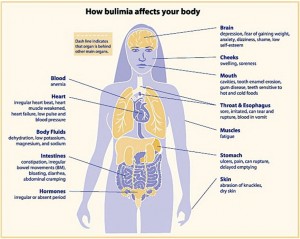-
What are Eating Disorder Treatment Centers?
Tuesday, July 15th, 2025by Linda Martinez, Wellness Counselor
 Are you always thinking about food, losing weight and how your body looks in the mirror? Do you often binge on high calorie foods and then feel guilty about it later?
Are you always thinking about food, losing weight and how your body looks in the mirror? Do you often binge on high calorie foods and then feel guilty about it later? If you are obsessed with your weight and body image and deal with stress via emotional eating, then you may be suffering from an eating disorder. This is a serious matter, because compulsive eating disorders left untreated can lead to serious health problems and even death in certain cases.
Types of Eating Disorders:
- Binge Eating – Sometimes called food addiction or compulsive overeating, people who suffer from a binge eating disorder are obsessed with thoughts about food as a way to deal with uncomfortable emotions. Binge eaters often stuff themselves with foods high in sugar and carbohydrates, eventually leading to a multitude of physical and psychological problems.
- Anorexia Nervosa – Anorexia is an eating disorder manifested by restriction of food which leads to starving oneself. People who suffer from anorexia have a greater than 15 percent chance of eventually dying from this condition.
- Bulimia Nervosa – Bulimia is an eating disorder where a person gorges him or herself on large quantities of food and then purges the food through vomiting or laxative abuse. This vicious cycle of binging and purging is repeated several times a week or even several times a day.
What Causes Eating Disorders?
Eating disorders are your brain’s attempt to use food consumption and subsequent weight control to deal with internal emotional issues that have nothing to do with food or weight. Individuals with eating disorders are usually grappling with a variety of emotional problems. Happy and satisfied people do not normally have eating disorders.
An eating disorder is a reflection of inner emotional and psychological distress. That’s why eating disorders cannot be overcome by willpower alone. Until the root of the emotional problems is addressed, the binging, purging and other emotional eating behaviors will continue.
Eating disorders are complex psychological and physical addictions. People suffering from eating disorders find that their personal relationships and daily activities are negatively affected. Without professional help, eating disorders manifest themselves in physical problems, mood swings, and sometimes even death.
Getting Help for Eating Disorders:
A compulsive eating disorder that leads to binge eating, anorexia or bulimia is a warning signal that one’s health is in crisis. It’s vital that you address the underlying emotional issues that are responsible for your unhealthy relationship with food. Treatment through counseling and behavior modification has saved thousands of lives.
That’s why it’s important to seek out eating disorder treatment centers and get professional help. Eating disorder clinics in California are concentrated in the Los Angeles area. But every large metropolitan area has bulimia and anorexia treatment available.
Eating disorder treatment centers can be found online or by consulting your local obesity help center. Make sure that the staff are licensed professionals who are experienced in dealing with anorexia nervosa, bulimia nervosa and binge eating. A weight loss patch may help as a temporary measure.
Fortunately, eating disorders can be overcome if you make the necessary commitment to dealing with the emotional eating issues at the root of most food addictions.
Recovery from Eating Disorders: Admitting You Have a Problem
The path to eating disorder recovery begins with acknowledging that you have a problem. This can be hard to do, especially if you’re stubbornly holding on to the belief that weight loss and a slimmer body is the key to happiness. Even when you finally realize that there is much more to happiness than one’s body image, it’s still hard to change your ways.
The good news is that eating disorders can be overcome if you’re motivated to change and willing to ask for professional help. Having said that, overcoming an eating disorder involves more than simply giving up unhealthy eating habits. On a deeper level, it is about getting in touch with who you are beyond your own particular body image.
It may be embarrassing to seek help for an eating disorder but gaining the support of a friend, family member or school counselor is for many people the first step to recovery. Some individuals find it easier to discuss their problem with a licensed professional, such as an eating disorder counselor or nutritionist.
Recovery from an eating disorder is a lot easier when you have an experienced, caring health professional to support you. That’s why it’s vital to find a professional counselor or nutritionist with experience in treating anorexia or bulimia. It’s best to find a therapist who makes you feel comfortable, accepted, and safe.
To find an eating disorder treatment specialist in your area, search the internet or call the National Eating Disorders Association hotline at 1-800-931-2237. Remember, eating disorder recovery begins with admitting you have a problem and not being afraid to ask for help. Go ahead, you can do it!
(published October 18, 2010)



